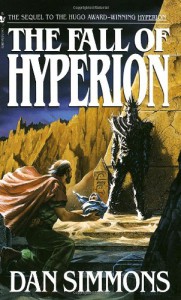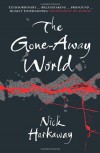The Fall of Hyperion
 Pain is the curl and foam of a wave that does not break.
Pain is the curl and foam of a wave that does not break.So, I'm writing this review around three full months after reading The Fall of Hyperion, and I'm still not really sure what to say about it. Did I enjoy it? Absolutely. Did I think it was as good as Hyperion? Absolutely not. But then, in the realm of science fiction, Hyperion, for me, was a cut above the rest. This is a perfectly satisfying conclusion, one that I am happy with, and one that answers a lot of the weirdness that went on in Hyperion.
As my memory of what happened at what point in this story wanes, I have but a few general points to make about the story. This very much feels like a resolution, in that almost all of the question that you have at the end of Hyperion – and there are or will be many! - are answered in a way that might be satisfying to you, or might not, depending on what you really wanted out of the story. I think, perhaps, my favourite of the character progressions/”stories” were those of Meina Gladstone and Sol Weintraub (though not that of his daughter – which I know sounds weird given how tied up they were together. But what happens to him in the story is fine, while the whole Rachel/Moneta thing felt both creepy and overly-convenient to me. It's probably not a point I could solidly defend, but it is one that reduced my enjoyment of Rachel's involvement in things.) The extended portrayal of Sol's grief and hope really felt incredibly realistic to me, so I appreciated the sensitive treatment of such here.
As for Meina, well, I just have a thing for morally ambiguous female leaders (Malazan slight spoiler think Tavore in MBotF, perhaps?). The exploration of the relationships between the AI and the humans is much more fleshed out here too – I had some difficulty in grasping it in the first book but my fears were allayed by the events of this one. That doesn't hold true for some other things, though. I found what happened around the Time Tombs often felt like a bit of a plot device that changed to suit the other places he wanted the narrative to go. I also felt like ( the bits with the Keats persona dragged a little. I don't know if it was just me, but I would have preferred not to spend quite so much time with him compared to some of the other things that were happening or could have potentially happened.) I really wanted to spend more time, for example, on the Priest's story and the Catholic Church as a whole – I felt the way that organisation had shifted (and not shifted) over the years to be really intriguing, and I just wanted to read more in that direction.
I've been well warned by someone I trust to end my relationship with these books here, and so I shall. But it's been incredibly enjoyable and rewarding. While I may not have enjoyed this book as much as the first, it's far above average science fiction, and definitely one to read if you enjoy the genre. I give The Fall of Hyperion nine out of ten.




